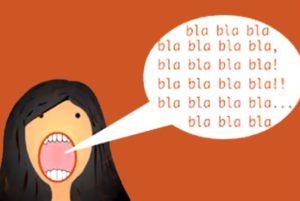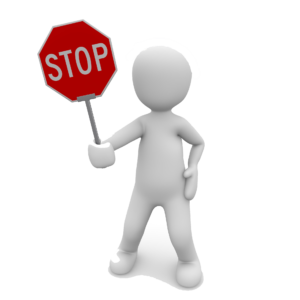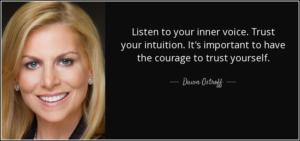Week 5 – Word of the Week: Listen
April 26, 2019 by Chaffee-Thanh Nguyen
Filed under Coaching, Personal Development
A Quiet Place
Hey everyone! This week’s word is Listen.
First, find a quiet place and then Shhhh….. lisetn. Do you hear that?
Wait… keep listening. There! Did you hear it?
If you didn’t, keep listening. There. There it is again. Pay attention. Listen real closely and you’ll hear it.
What is it?
It is the sound of your inner voice telling you things about yourself. Your TRUE inner voice that is.
Things that you should probably pay attention to and yet so many people don’t.
In fact, the art of listening is a lost art for many, many people.
And it’s no wonder why either. In his best-selling book, 7 Habits of Highly Effective People, author Steven R Covey, points out that our education and socialization has placed an emphasis on teaching us how to communicate (e.g. read, write, and speak), but doesn’t prepare us to really listen to what others are saying. It doesn’t prepare us to listen to what our own bodies, minds, and emotions are saying either.
Interestingly, when it comes to learning about listening, most teachings are about listening to others, not to yourself.
In most business books, that’s all there is an emphasis on.
For example, in Kenneth Blanchard and Spencer Johnson’s book, The One Minute Manager, which many people consider as one of the best business books ever, they spend a lot of time discussing how the best way to engage employees is to allocate time to listen to employees. This allows a manager to solicit feedback and proactively find out about problems before they escalate. And it lets them get to know people as individuals and ensure that they feel genuinely valued.
What’s not discussed a whole lot in the book is how to listen to yourself and your management style. How to listen to what your body is telling you and what your emotions are saying. How to listen to your stress levels, concerns, and excitements.
By the way, you can get both books on Amazon (and if you buy them by clicking through these links, I’ll get something from Amazon).
EI EQ O
Using Emotional Intelligence (EI or EQ for Emotional Quotient for some), you can learn a lot of this. Part of it focuses on self-awareness and self-regulation or management. The only challenge is that Emotional intelligence is a relatively newer study which began to emerge in 1990. And because it’s still relatively new, most people, schools, universities, and companies don’t even teach it.
I highly recommend you look into it though because it can be extremely life changing. Here’s a good book you can read to get started (as usual, if you buy anything this list link I’m going to get something something)
That aside, this week’s word is to listen.
Listen Listen
And while listening to others is very important in many aspects of business and life, listening to yourself is just as important or even more important. So let’s talk about these two facets of listening because I really had to use one of these facets a lot this week during my move more eat less implementation.
I Hear You
 First, as a coach, listening is one of the most important skills to have. It’s one that I’ve spent years working on and honing in order to best serve my clients.
First, as a coach, listening is one of the most important skills to have. It’s one that I’ve spent years working on and honing in order to best serve my clients.
The huge side effect of practicing to listen for the sake of my clients is the effect it’s had on my relationships. Turns out listening to your friends, family, children, and acquaintances can dramatically affect your relationships with them. It makes things stronger. It helps build trust and gives empathy.
This of course isn’t new.
In his best-selling book, How to Win Friends and Influence People, many of Dale Carnegie’s golden rules revolve around listening.
| Dale says you should “be a good listener, encourage others to talk about themselves, become genuinely interested in other people, try honestly to see things from the other person’s point of view, and be sympathetic to the other person’s ideas and desires.”
Doing so let’s the other person feel like they are being heard. It gives empathy, and empathy is like a virus – it’s contagious. In fact, through empathy, you can change someone physically as well as emotionally. It’s a gut check. It’s a powerful emotion of satisfaction, comfort, and understanding. |
When people feel heard, they feel like a weight has been lifted off of their shoulders; the monkey is off their back; a burden is relieved.
They feel like they matter.
You Matter.
Zeno of Citium says, “We have two ears and one mouth, so we should listen more than we say.”
Look at the Chinese symbol of “To Listen” in the image below.
Notice how it’s actually composed of several symbols including Ear, You, Eyes, Undivided Attention, and Heart. Now imagine that every conversation you had you listened with every one of those items.
You heard the other person with your ears.
You heard what they were saying with your eyes by reading their lips, their body language, their emotions, and motions.
You gave them UNDIVIDED attention as if they were the ONLY person that mattered in the Universe at that moment in time.
And you listened with your heart, absorbing the conversation and making a real attempt to emotionally connect with the other person.
How would your conversations be?
How would your relationships change?
How would that impact your life and the lives of those you listen to?
Would it make an impact at work, with your friends, your significant other (would it help get you a significant other), your family?
I remember this one time I met someone at a networking event and I had time to spare, so I introduced myself and she introduced herself. She then started talking about herself and all the things she was interested in doing and wanted to accomplish.
 Fast forward and it turns out that she kept on talking non-stop for about 30 minutes. During that entire time, all I did was nod my head and gave a grunt or two of acknowledgement. I gave her my full attention and made eye contact the entire time.
Fast forward and it turns out that she kept on talking non-stop for about 30 minutes. During that entire time, all I did was nod my head and gave a grunt or two of acknowledgement. I gave her my full attention and made eye contact the entire time.
When she finally came up for air, she exclaimed, “Wow! That’s the best conversation I’ve had in a long time!”
Mind you, I didn’t say a single word the entire time.
To her though, I listened and it was a GREAT conversation – even though conversations are usually two-sided. I really couldn’t do anything except laugh and wish her the best.
Have you ever experienced something similar?
Test it out. Next time you’re out with someone, listen fully and see what happens.
When you learn how to listen powerfully and fully, pay attention and see how that can change your life.
Your Inside Voice
What does that all have to do with me this week though?
Well nothing and that was just one facet of the word of listen. Remember the other facet?
The other facet had everything to do with me this week – cause remember, it’s all about me.
I started this post telling you to listen to your inner voice.
And well this week, I did some heavy listening to my inner voice and more importantly, my body.
And do you know what my body said?
It said, “Stop moving so much.”
 Since I’m implementing a “Eat Less and Move More” habit into my life, this internal vocalization was counterintuitive and opposite to what I wanted to hear.
Since I’m implementing a “Eat Less and Move More” habit into my life, this internal vocalization was counterintuitive and opposite to what I wanted to hear.
Has that ever happened to you?
Have you ever wanted to do something only something inside of you said not to do it?
Did you listen to that voice? Maybe you call it your gut. Maybe you call it your intuition, your sixth-sense. Maybe it’s just a feeling, an emotion. Maybe something more. Who knows and did you listen to it?
If you didn’t, what were the results?
If you did, what were the results?
Let’s explore this further cause in reality, there are two voices talking to you at most times.
Are You Bedazzled?
At this point you can imagine the Devil on one shoulder and an Angel on the other. If you don’t know what I’m talking about, then check out the movie Bedazzled with Elizabeth Hurley and Brendan Fraser. It’s a pretty silly, funny movie where Liz Hurley is the devil. Anyway, no spoilers, so go watch it.
Fact of the matter is that it’s true for many people. You can have a positive self-talk going on in your head encouraging you to do good things, right things, and/or you can have negative self-talk going on in your head putting you in undesirable and often times dangerous situations. Depending upon your level of belief, confidence, and support, you may listen to one voice over the other.
Back in the day, many moons ago when I was a teenager, I never wanted to be alone.
I surrounded my self with activities and hung out with anyone and everyone all the time.
The reason? I was afraid of my thoughts.
I was afraid of my inner voice which at that time was mostly negative.
I was afraid of what I was telling myself – that I was weak, stupid, ugly, that no one liked me or cared about me.
Keeping myself busy and surrounding myself with others allowed me to AVOID listening to myself.
I remember joining as many school activities that I could.
I had to go to school early – before classes for clubs and organizations that met before school started. And then I stayed after school joining different clubs, organizations, and sports to keep myself busy. I wouldn’t get home from school until 8, 9, or 10 pm some nights. Then I hurriedly did my homework and fell asleep only to wake up early the next day and start over again.
And you know why it was scary?
It was scary because I didn’t want to be alone and at the same time I was shy and uncomfortable around people. While most people didn’t know this as I was always around, active, and sociable and most of it was an act – not the friendship part as I did build real friendships that last even till today – the outgoing, confident, fun person I was pretending to be at the time was an act. It was all so I wouldn’t be alone with my negative, depressing thoughts.
Can you relate to this?
Do you know someone like this?
The Kids Are NOT All Right
Did you know that suicide is the 10th leading cause of death in the United States (Source: https://afsp.org/about-suicide/suicide-statistics)? For people aged 15-24, suicide is the 2nd leading cause of death (Source: https://www.crisistextline.org/blog/change-the-stats). There is one death by suicide every 12 minutes and 123 Americans die by suicide every day. Yet only half of all Americans experiencing an episode of major depression receive treatment. Depression is the leading cause of disability worldwide (Source: https://save.org/about-suicide/suicide-facts).
The statistics are disturbing.
Many – not all – of these individuals wouldn’t feel this way if someone just listened to them, supported them, and taught them that they mattered. And without anyone to listen to them, they listened to their own negative inner thoughts and feelings and when down a dark spiral of depression.
Fortunately, because I surrounded myself with people to avoid myself, they rubbed off on me and because a powerful support group for me. I was eventually able to break free from my negative thinking and formed a new pattern of thinking.
Then through the years of training and personal development education that I went through, I’ve learned to love and appreciate life and everything it has to offer. I’ve learned to remove the negative thoughts and thinking from my head and how to celebrate life every day!
I believe that my experience back then has allowed me to relate and listen to people a lot better now. And when my mind, body, and soul tell me something, I’ve learned to listen to it.
In fact, the few times that I don’t listen to my inner voice, my gut, even though all outward experience tells me that I should do something, if I go ahead and do it and ignore my inner voice, the outcome has always been undesirable.
So now, I listen to my inner voice.
I listen to my body and what it’s telling me.
And then I take it one step further.
I work to see, feel, hear, touch, and smell my inner feelings, to understand what it’s working on telling me. What it wants to tell me.
Let me give you an example and an exercise.
Feel The Pain, Be The Pain
Have you ever had a headache?
 Did you just pop a couple Tylenol or Advil and then think nothing of it?
Did you just pop a couple Tylenol or Advil and then think nothing of it?
Did it go away or did it stick around and annoy you incessantly?
Next time you have a headache do this instead.
Close your eyes.
Visualize in your mind where your head hurts.
Imagine the pain in different colors – like a blob, a mass, or clump or stuff just hanging out in your head wherever it is. See how big it is in your mind’s eye.
What color is it?
How does it feel?
Is it sharp, soft, smooth, bumpy, dirty, icky?
Now how does it smell compared to the healthy, non-painful part of your head or body?
Does it stink? What does it smell like?
A rotting corpse? A decaying flower? Raw uncooked meat? Or cotton candy? Something you like or something you despise? (typically, if it’s painful, it’s something you despise).
See it, feel it, smell it, hear it.
What does it sound like?
Is it a loud piercing ringing sound or a dull thud, thump, thump, thump sound?
Now get a good description of it in your mind’s eye. Know it, understand it, feel it.
Once you’ve got a handle on it now ask it why it’s hurting.
Remember, it’s part of you at this moment in time.
Why is it in pain and causing you pain?
See if you can get an answer. See if you can understand your pain.
Now imagine that pain getting smaller.
Imagine it changing colors from something that hurts you to something that’s beautiful.
Imagine it starting to smell like something wonderful and good.
And imagine that pain starting to shrink smaller and smaller.
Continue to visualize it getting smaller and smaller until eventually it disappears.
Now open your eyes and how do you feel?

Now we did a few things there and one of the main things was listening to the pain instead of ignoring it or avoiding it.
You’ll find that once you start to listen to things that hurt and understand it, you’ll be able to deal with it. Of course the caveat of using this technique is that if you have some kind of chronic issue, sickness, or disease this can only help alleviate the pain a little. You will have to find out what’s really causing the pain and work to resolve that if possible.
Suicide and depression are serious issues in which many people need help with in dealing. Fortunately, there are new studies and programs like the Electroconvulsive Therapy program as the University of Utah that’s helping people. There is also the Burst Suppression Therapy which uses propofol to reset brain circuitry and the Esketamine Nasal Spray, approved by the FDA on March 5 and works in conjunction with oral antidepressants. Vagus Nerve Stimulation reboots the brain through the vagus nerve in the neck. You can find out more about these therapies at http://psychiatry.org/patients-families/depression.
And remember, whether it’s emotional or physical pain, for many people focusing on listening, understanding, and empathizing can have a huge impact on their lives versus just using drugs or avoiding the issue completely… especially when it comes to kids.
H.A.L.T. In The Name Of Love!
Daniel Seager, author of the book, No Drama Discipline has a great acronym one what to do when children act out. He says that children only act out when they are:
Hungry
Angry
Lonely
Tired
You should H.A.L.T. and listen to them. Pause and understand why they are acting out. Only then can you address what’s really going on with them.
Of course, the same can be said for most adults. They too act out when they are hungry, angry, lonely, or tired.
My son is now at an age where he’s out and about and has developed his own personality. Sometimes he does things that I don’t understand – I’m not even sure if he understands it. Often times my wife and I will tell him NOT to do something and then he proceeds to do the exact thing that we told him not to do.
My default reaction is to yell at him because he not only didn’t listen to us, he completely ignored us and did the exact thing he wasn’t supposed to do. It’s almost as if he has a mental block that’s developed somehow. Of course, I think a lot of parents feel this way. As much as you love your kids, sometimes they confuse and frustrate you. Getting mad at them doesn’t help though and neither does yelling .
 Yelling at my kid seems to go in one ear and out the other. Having a discussion with him and asking him questions like, “why did you just do what we told you not to do?” And then more importantly, listening to what he has to say is critical to understanding why he has this mental block. It shows him that I care – that he matters. And that he needs to learn how to pay attention and listen. Yelling at him just makes him ignore and block me even more.
Yelling at my kid seems to go in one ear and out the other. Having a discussion with him and asking him questions like, “why did you just do what we told you not to do?” And then more importantly, listening to what he has to say is critical to understanding why he has this mental block. It shows him that I care – that he matters. And that he needs to learn how to pay attention and listen. Yelling at him just makes him ignore and block me even more.
Don’t Be A Blockhead – Unless You’re Playing Minecraft
 Speaking of blocks, sometimes you might have your own mental blocks and it’s easy to yell at yourself. In reality, the best thing is to HALT and ask yourself some questions and listen to your own mental answers. You might be surprised to find why you do some of the things you do.
Speaking of blocks, sometimes you might have your own mental blocks and it’s easy to yell at yourself. In reality, the best thing is to HALT and ask yourself some questions and listen to your own mental answers. You might be surprised to find why you do some of the things you do.
So as I said earlier, my body told me this week to “Stop moving so much”. In fact, it was somewhat yelling it to me.
If you read one of my previous posts (Week 1 – Word of the Week: Pain), I talked about doing the Beach Body Insanity program. It is a 60 day program and after 45 days, my body gave out. First, I almost passed out 3 times on the first day. Then I just pushed through the pain for the next 44 days.
I was going for the full 60 days and my body just couldn’t take it. It gave out on me. I actually had to stop the program and it took about 6 – 8 weeks for me to recover. By then, I had lost all momentum and got busy doing other things, so I never restarted the program.
This time, I was determined not to make the same mistake.
“Those who do not learn history are doomed to repeat it.” — George Santayana
So this time, I listened to my body and, I stopped moving more this week.
In fact, I didn’t do much of anything except sit and rest. While I kept the “Eat Less” portion of my personal integration, I also moved less – a lot less – hardly at all.
And it was much needed and welcomed.
Sometimes, you just have to let your body heal.
Even though I’m not working out NEARLY as hard as I used to, I’m not as young as I used to be, so my body requires a bit longer to heal than before. So my body said, “Stop moving more” and I listened.
So this week, I don’t know how much if any weight I lost. So nothing to report. I do know that after 4 weeks of integrating these habits into my life I’m still in pain. Hahahaha. And I did go down by 10 pounds. More importantly, before this week, I was able to move more without getting as tired. So my cardiovascular system is improving and that was one of the main goals.
I’m not running any 5k’s yet and sometime later this year maybe.
We’ll have to see.
In the mean time, I’m going to continue listening to my body and the voice in my head telling me what I need to do in order to build strong, healthy habits.
Now I know that there’s a good chance that you’ve never been taught how to listen to yourself, and it’s possible that you may have even mistaken the chatter in your head for the real you.
And there can be a lot of chatter – especially from the inner critic that tells you that you’re not good enough, smart enough, or good looking enough or that nothing you do matters – when of course, it does. Chatter that makes you worry about the past, future, and even present. And chatter that makes you so afraid, angry, upset, and scared that you’re immobile.
 In her book, Heather B Armstrong, author of The Valedictorian of Being Dead: The True Story of Dying Ten Times to Live, said that at one point in time, she, “fell to the floor. I rocked back and forth, and then I started howling. I felt a cold and dangerous darkness start to wrap itself around me as if it were going to strangle me. I was terrified.”
In her book, Heather B Armstrong, author of The Valedictorian of Being Dead: The True Story of Dying Ten Times to Live, said that at one point in time, she, “fell to the floor. I rocked back and forth, and then I started howling. I felt a cold and dangerous darkness start to wrap itself around me as if it were going to strangle me. I was terrified.”
It was all that chatter in her head telling her that “I would be alone forever… that my girls would be so much better without me… someone else would be a better mother…. I was terrified I would never stop feeling this way.
Fortunately, Heather got help and has a great appreciation of life now. So what about you? How do you hear yourself through the chatter?
One technique to help you is to use free form journaling. Simply write down all the worries in your head as fast as you can. Write down all the judgments, the sadness, the fears, the anger, and the self-criticism. Don’t even worry if it’s legible or not, just write it all down.
As you write, what you’ll discover is that you end up writing your way through to your true voice. You start finding out what it is that you truly want.
Now this might take a while at first to get through to yourself and the more you practice doing this, the easier it gets and the faster you’ll arrive at your real voice.
Some people can even do this by just speaking your inner chatter out loud, ranting and raving your way through the pain.
Just keep talking until something you say resonates with you and starts making you feel better. I would caution that if you intend to do this technique verbally that you find a quiet place that is in private where no one else can hear you otherwise you might have to add embarrassment to your list of challenges.
Then again, someone might hear you and be concerned and offer a helping hand.
Either way, write or talk your way through the chatter to find out your true voice and proceed from there.And remember… Listen.
Listen to your true voice. Listen to yourself.
Drop me a line or comment below and let me know if this is helpful for you.
Until then, Celebrate Life!
Chaffee-Thanh Nguyen



